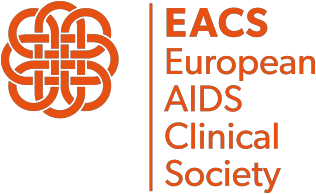COVID-19
Epidemiology and risk factors for severe COVID-19 in persons with HIV
- More adverse COVID-19 outcomes (hospitalization, disease severity, mortality) have been reported in unvaccinated persons with HIV and CD4 count < 200-350 cells/µL or uncontrolled viral load when compared to the general population and to persons with HIV with higher CD4 count and controlled viral load, with a possible increasing association of COVID-19 severity with higher HIV viral load
-
Higher rates of SARS-CoV-2 breakthrough infections have been reported in fully vaccinated persons with HIV when compared to the general population
- An increased incidence of severe COVID-19 has been described in persons with concomitant OIs (especially TB and PcP) and associated comorbidities
Management of HIV infection during COVID-19 infection
-
In case of lockdown or home isolation, it is important to ensure continuum of HIV-care. Consider teleconsultation and phone visits for stable persons, not requiring changes in ART or co-medications. Retain in-person visits for persons recently diagnosed with HIV and initiating ART, or complaining of acute problems, adverse effects due to ART, virological failure, STIs or other complains/ co-morbidities requiring clinical evaluation. Consider tele-pharmacy, and ensure continuous ART supply
-
New development or worsening of mental health problems (anxiety, depression, increased loneliness and stigma) have been very common following social distancing and lockdowns; psychological/psychiatric and social support should be actively offered, and well-being general measures (e.g. diet/ exercise) should be recommended
-
ART should neither be stopped nor modified due to recently diagnosed SARS-CoV-2 infection, unless strictly necessary (no ARV drug has proved to be clinically effective against SARS-CoV-2 infection). The ART regimen should be adapted in persons who are unable to swallow their ARV drugs (e.g., those on mechanical ventilation or ECMO therapy). See Administration of ARVs in persons with swallowing difficulties
-
HIV-RNA blips have been described during COVID-19, their clinical relevance is unknown
-
Co-morbidities and co-infections should be managed as indicated in specific sections of the Guidelines, see Prevention and Management of Comorbidities, Viral hepatitis co-infections, Opportunistic infections
Management of COVID-19
Diagnostic approach and differential diagnosis:
-
The same approach, as for general population, should be applied, according to the national or international recommendations. For details, see WHO recommendations
-
For persons with poor immune status, other respiratory diseases (e.g., PcP, and TB) should be considered as differential diagnosis. Appropriate diagnostic workup should follow current recommendations, see Opportunistic infections
-
Isolation precautions should be the same as for the general population, although persons with uncontrolled HIV infection may show long-term viral shedding, relevance or risk for transmission are unknown
Treatment approach
-
Treatment of COVID-19 should be the same as for general population. As treatment guidelines and prescription requirements for COVID-19 might vary between countries, refer to national guidelines. In absence of those, follow international recommendations: WHO
-
Several early treatments with anti-SARS-CoV-2 antiviral agents are available to prevent COVID-19 progression to severe disease. People with HIV may be eligible for such treatments, according to local guidelines, and those with AIDS, poor immune responses to ART and/or ART-untreated HIV infection should be preferentially considered for early anti-SARS-CoV-2 treatment initiation
-
Check for drug-drug interactions and overlapping toxicities between COVID-19 treatments (particularly nirmatrelvir/ritonavir or other anti-SARS-CoV-2 directed agents, corticosteroids, and anticoagulants) and ARV drugs, see table Drug-drug Interactions between COVID-19 Therapies and ARVs, Drug-drug Interactions and Other Prescribing Issues, Drug-drug Interactions between Corticosteroids and ARVs
Management of long-term symptoms and sequelae of COVID-19 (Post-acute COVID-19 syndrome, PACS)
-
A substantial proportion of COVID-19 patients may show progressive or newly presenting symptoms, involving the lungs or other organs, weeks to months after COVID-19 (post-acute COVID-19 syndrome, PACS); studies addressing whether frequency of PACS is increased in persons with HIV are ongoing, but some preliminary results suggest a higher prevalence of PACS in persons with HIV
-
These conditions should be specifically addressed and evaluated; refer to the appropriate specialist consultations following local/national guidelines for persistent COVID-19 sequelae
-
Check for drug-drug interactions if any treatment for post- COVID-19 complications is initiated, see Drug-drug interactions and Other Prescribing Issues, Drug-drug interactions between COVID-19 therapies and ARVs, Drug-drug interactions between corticosteroids and ARVs
Prophylaxis of COVID-19 in persons with HIV
Vaccination guidelines as well as prescription requirements for anti-SARS-CoV-2 pharmacological prophylaxis might vary between countries, and the efficacy of specific antiviral agents may differ against different SARS-CoV-2 variants. Please refer to national guidelines and local epidemiology or international recommendations: WHO
SARS-CoV-2 prevention:
-
It is recommended for all persons with HIV to be vaccinated against SARS-CoV-2. There is no data to recommend a specific vaccine and the choice depends on the availability in individual countries. Priority should be given to those with immunosuppression (CD4 count < 350 cells/μL), if access to vaccines is limited, see Immunisation in Persons with HIV
-
Persons with advanced disease (CD4<200 cells/mm3) and/or detectable VL have poorer humoral and cellular mediated immune responses to vaccination, and are candidates for booster doses following local guidelines (see Immunisation in Persons with HIV)
-
Other vaccines (particularly S pneumoniae and influenza) should be given as scheduled, see Immunisation in Persons with HIV
-
Links to an overview of available vaccines and information regarding SARS-CoV-2 vaccination in persons with HIV: BHIVA; WHO; EACS
-
Passive immunization with antibodies against SARS-CoV-2 has been considered as pre-exposure prophylaxis (PrEP) in unvaccinated persons or in those with advanced immunodepression. As sensitivity of circulating variants to these agents may vary, please refer to local guidelines and epidemiology
